#DevOps Mastery
Explore tagged Tumblr posts
Text

#DevOps#DevOps Mastery#DevOps Nastery Course#devops mastery training#DevOps mastery Internship#e3l#e3l.co
0 notes
Text

Experience the transformative force of DevOps with Algoworks! Embrace streamlined teamwork, automation, and inventive solutions as we unite Cloud technology with your aspirations.
Join us on the path to DevOps mastery!
1 note
·
View note
Text
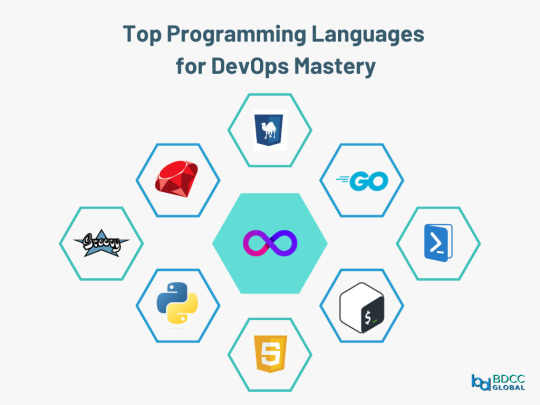
🚀 Elevate your DevOps game with the Top 10 Programming Languages for mastery! 💻✨
Unlock efficiency, automation, and seamless integration. 🌐💡 Which language fuels your DevOps journey? Share your favorites!
0 notes
Text
DevOps Mastery: Key Principles & Artful Tactics 2023
Introduction In the realm of software development, DevOps has emerged as a revolutionary approach, blending development and operations
0 notes
Text
Essentials You Need to Become a Web Developer
HTML, CSS, and JavaScript Mastery
Text Editor/Integrated Development Environment (IDE): Popular choices include Visual Studio Code, Sublime Text.
Version Control/Git: Platforms like GitHub, GitLab, and Bitbucket allow you to track changes, collaborate with others, and contribute to open-source projects.
Responsive Web Design Skills: Learn CSS frameworks like Bootstrap or Flexbox and master media queries
Understanding of Web Browsers: Familiarize yourself with browser developer tools for debugging and testing your code.
Front-End Frameworks: for example : React, Angular, or Vue.js are powerful tools for building dynamic and interactive web applications.
Back-End Development Skills: Understanding server-side programming languages (e.g., Node.js, Python, Ruby , php) and databases (e.g., MySQL, MongoDB)
Web Hosting and Deployment Knowledge: Platforms like Heroku, Vercel , Netlify, or AWS can help simplify this process.
Basic DevOps and CI/CD Understanding
Soft Skills and Problem-Solving: Effective communication, teamwork, and problem-solving skills
Confidence in Yourself: Confidence is a powerful asset. Believe in your abilities, and don't be afraid to take on challenging projects. The more you trust yourself, the more you'll be able to tackle complex coding tasks and overcome obstacles with determination.
#code#codeblr#css#html#javascript#java development company#python#studyblr#progblr#programming#comp sci#web design#web developers#web development#website design#webdev#website#tech#html css#learn to code
2K notes
·
View notes
Text
The Roadmap to Full Stack Developer Proficiency: A Comprehensive Guide
Embarking on the journey to becoming a full stack developer is an exhilarating endeavor filled with growth and challenges. Whether you're taking your first steps or seeking to elevate your skills, understanding the path ahead is crucial. In this detailed roadmap, we'll outline the stages of mastering full stack development, exploring essential milestones, competencies, and strategies to guide you through this enriching career journey.

Beginning the Journey: Novice Phase (0-6 Months)
As a novice, you're entering the realm of programming with a fresh perspective and eagerness to learn. This initial phase sets the groundwork for your progression as a full stack developer.
Grasping Programming Fundamentals:
Your journey commences with grasping the foundational elements of programming languages like HTML, CSS, and JavaScript. These are the cornerstone of web development and are essential for crafting dynamic and interactive web applications.
Familiarizing with Basic Data Structures and Algorithms:
To develop proficiency in programming, understanding fundamental data structures such as arrays, objects, and linked lists, along with algorithms like sorting and searching, is imperative. These concepts form the backbone of problem-solving in software development.
Exploring Essential Web Development Concepts:
During this phase, you'll delve into crucial web development concepts like client-server architecture, HTTP protocol, and the Document Object Model (DOM). Acquiring insights into the underlying mechanisms of web applications lays a strong foundation for tackling more intricate projects.
Advancing Forward: Intermediate Stage (6 Months - 2 Years)
As you progress beyond the basics, you'll transition into the intermediate stage, where you'll deepen your understanding and skills across various facets of full stack development.
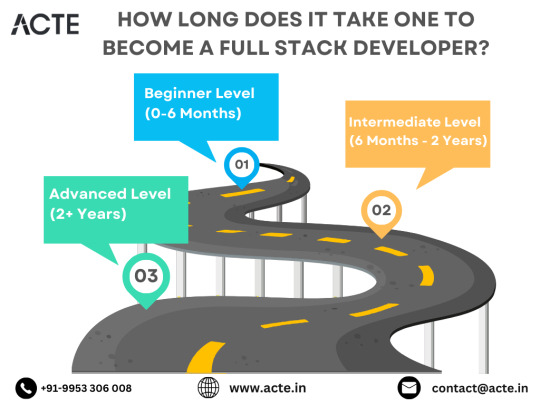
Venturing into Backend Development:
In the intermediate stage, you'll venture into backend development, honing your proficiency in server-side languages like Node.js, Python, or Java. Here, you'll learn to construct robust server-side applications, manage data storage and retrieval, and implement authentication and authorization mechanisms.
Mastering Database Management:
A pivotal aspect of backend development is comprehending databases. You'll delve into relational databases like MySQL and PostgreSQL, as well as NoSQL databases like MongoDB. Proficiency in database management systems and design principles enables the creation of scalable and efficient applications.
Exploring Frontend Frameworks and Libraries:
In addition to backend development, you'll deepen your expertise in frontend technologies. You'll explore prominent frameworks and libraries such as React, Angular, or Vue.js, streamlining the creation of interactive and responsive user interfaces.
Learning Version Control with Git:
Version control is indispensable for collaborative software development. During this phase, you'll familiarize yourself with Git, a distributed version control system, to manage your codebase, track changes, and collaborate effectively with fellow developers.
Achieving Mastery: Advanced Phase (2+ Years)
As you ascend in your journey, you'll enter the advanced phase of full stack development, where you'll refine your skills, tackle intricate challenges, and delve into specialized domains of interest.
Designing Scalable Systems:
In the advanced stage, focus shifts to designing scalable systems capable of managing substantial volumes of traffic and data. You'll explore design patterns, scalability methodologies, and cloud computing platforms like AWS, Azure, or Google Cloud.
Embracing DevOps Practices:
DevOps practices play a pivotal role in contemporary software development. You'll delve into continuous integration and continuous deployment (CI/CD) pipelines, infrastructure as code (IaC), and containerization technologies such as Docker and Kubernetes.
Specializing in Niche Areas:
With experience, you may opt to specialize in specific domains of full stack development, whether it's frontend or backend development, mobile app development, or DevOps. Specialization enables you to deepen your expertise and pursue career avenues aligned with your passions and strengths.
Conclusion:
Becoming a proficient full stack developer is a transformative journey that demands dedication, resilience, and perpetual learning. By following the roadmap outlined in this guide and maintaining a curious and adaptable mindset, you'll navigate the complexities and opportunities inherent in the realm of full stack development. Remember, mastery isn't merely about acquiring technical skills but also about fostering collaboration, embracing innovation, and contributing meaningfully to the ever-evolving landscape of technology.
#full stack developer#education#information#full stack web development#front end development#frameworks#web development#backend#full stack developer course#technology
10 notes
·
View notes
Text
Navigating the DevOps Landscape: A Comprehensive Roadmap for Success
Introduction: In the rapidly evolving realm of software development, DevOps stands as a pivotal force reshaping the way teams collaborate, deploy, and manage software. This detailed guide delves into the essence of DevOps, its core principles, and presents a step-by-step roadmap to kickstart your journey towards mastering DevOps methodologies.
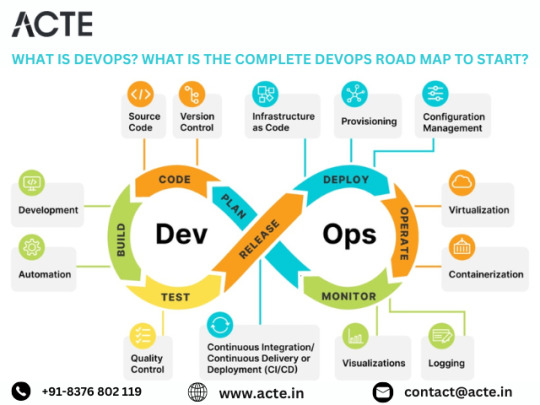
Exploring the Core Tenets of DevOps: DevOps transcends mere toolsets; it embodies a cultural transformation focused on fostering collaboration, automation, and continual enhancement. At its essence, DevOps aims to dismantle barriers between development and operations teams, fostering a culture of shared ownership and continuous improvement.
Grasping Essential Tooling and Technologies: To embark on your DevOps odyssey, familiarizing yourself with the key tools and technologies within the DevOps ecosystem is paramount. From version control systems like Git to continuous integration servers such as Jenkins and containerization platforms like Docker, a diverse array of tools awaits exploration.
Mastery in Automation: Automation serves as the cornerstone of DevOps. By automating routine tasks like code deployment, testing, and infrastructure provisioning, teams can amplify efficiency, minimize errors, and accelerate software delivery. Proficiency in automation tools and scripting languages is imperative for effective DevOps implementation.
Crafting Continuous Integration/Continuous Delivery Pipelines: Continuous Integration (CI) and Continuous Delivery (CD) lie at the heart of DevOps practices. CI/CD pipelines automate the process of integrating code changes, executing tests, and deploying applications, ensuring rapid, reliable, and minimally manual intervention-driven software changes.
Embracing Infrastructure as Code (IaC): Infrastructure as Code (IaC) empowers teams to define and manage infrastructure through code, fostering consistency, scalability, and reproducibility. Treating infrastructure as code enables teams to programmatically provision, configure, and manage infrastructure resources, streamlining deployment workflows.

Fostering Collaboration and Communication: DevOps champions collaboration and communication across development, operations, and other cross-functional teams. By nurturing a culture of shared responsibility, transparency, and feedback, teams can dismantle silos and unite towards common objectives, resulting in accelerated delivery and heightened software quality.
Implementing Monitoring and Feedback Loops: Monitoring and feedback mechanisms are integral facets of DevOps methodologies. Establishing robust monitoring and logging solutions empowers teams to monitor application and infrastructure performance, availability, and security in real-time. Instituting feedback loops enables teams to gather insights and iteratively improve based on user feedback and system metrics.
Embracing Continuous Learning and Growth: DevOps thrives on a culture of continuous learning and improvement. Encouraging experimentation, learning, and knowledge exchange empowers teams to adapt to evolving requirements, technologies, and market dynamics, driving innovation and excellence.
Remaining Current with Industry Dynamics: The DevOps landscape is dynamic, with new tools, technologies, and practices emerging regularly. Staying abreast of industry trends, participating in conferences, webinars, and engaging with the DevOps community are essential for staying ahead. By remaining informed, teams can leverage the latest advancements to enhance their DevOps practices and deliver enhanced value to stakeholders.
Conclusion: DevOps represents a paradigm shift in software development, enabling organizations to achieve greater agility, efficiency, and innovation. By following this comprehensive roadmap and tailoring it to your organization's unique needs, you can embark on a transformative DevOps journey and drive positive change in your software delivery processes.
2 notes
·
View notes
Text
Navigating the Future: Thriving in Automation Testing Careers
In the dynamic landscape of technology, the future of automation testing emerges as a strategic and rewarding career choice, offering enduring prospects and continuous evolution. Here's a deep dive into why automation testing is not just a profession but a journey towards a future filled with opportunities and advancements.

1. Pioneering Technological Evolution: Positioned at the forefront of technological advancements, automation testing serves as a trailblazer, ensuring seamless adaptation to emerging technologies and future innovations.
2. Anchored in Agile and DevOps Realms: The widespread embrace of Agile and DevOps methodologies propels automation testing to the forefront. In an era demanding rapid software releases, automation testing becomes the linchpin for maintaining speed and reliability in development cycles.
3. Surging Demand for Quality Assurance: The escalating complexity of modern software necessitates robust quality assurance processes. Automation testing provides a systematic and efficient approach, meeting the rising demand for top-tier quality in software applications.
4. Efficiency Unleashed: A standout advantage of automation testing lies in its prowess to significantly reduce testing time and costs. Rapid and repetitive execution of automated tests enables efficient bug identification, ensuring swift development cycles.
5. Cross-Industry Versatility: The adaptability of automation testing transcends industry boundaries. Professionals can explore diverse opportunities across sectors like healthcare, finance, e-commerce, and gaming, opening up a spectrum of career avenues beyond conventional limits.
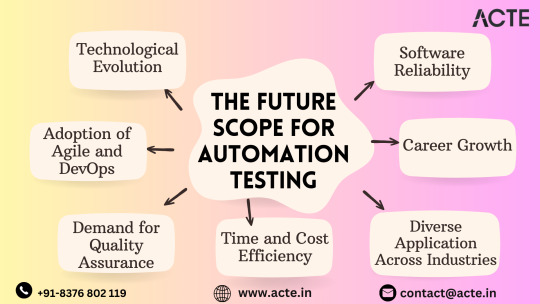
6. Skills Cultivation and Career Ascension: Opting for a career in automation testing provides an enriching environment for skill development. Mastery of automation tools, programming languages, and staying abreast of industry trends pave the way for substantial career growth. Roles such as automation test engineer, test architect, or quality assurance manager showcase the diverse career paths within reach.
7. Fostering Software Reliability: At the core of automation testing is its pivotal role in ensuring the reliability and performance of software applications. Early identification and resolution of issues in the development process contribute to delivering high-quality software products to end-users.
In conclusion, the future of automation testing is a voyage—an exploration of opportunities and advancements. For individuals with a tech-savvy mindset, attention to detail, and a commitment to software quality, choosing a career in automation testing is a forward-thinking and fulfilling decision. As the industry continues to pivot towards automated testing solutions, it remains a field of enduring relevance, promising a future rich with opportunities and impact.
3 notes
·
View notes
Text
Crafting a Career Odyssey: AWS Certification Unveiled for Solution Architects
Embarking on the journey of AWS certification as a Solution Architect unveils a plethora of career avenues, transforming your professional trajectory in the dynamic landscape of cloud computing. Let's explore the myriad paths that unfold for certified AWS Solution Architects:
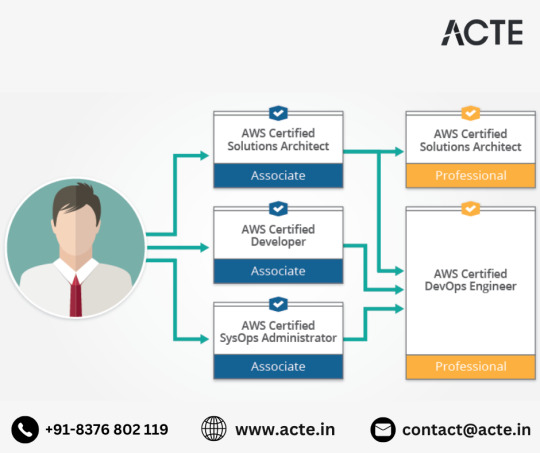
1. Architecting Excellence: Steering Digital Transformations AWS certification catapults you into roles where you architect and implement cutting-edge solutions. As a linchpin in digital transformations, you play a pivotal role in creating scalable, secure, and cost-effective solutions aligned with organizational objectives.
2. Cloud Architect Mastery: Orchestrating Comprehensive Cloud Strategies The journey doesn't stop at Solution Architect; it seamlessly transitions into broader Cloud Architect roles. Here, you orchestrate end-to-end cloud strategies, ensuring optimal performance, security, and efficiency in cloud-based environments.
3. Enterprise Architect Pinnacle: Shaping Holistic IT Strategies With AWS certification, the pathway extends to Enterprise Architect roles. This involves shaping the overarching IT strategy, aligning technology solutions with business goals, and ensuring seamless integration across the enterprise.
4. Cloud Consulting Expertise: Guiding Clients on Cloud Journey Organizations seek AWS-certified Solution Architects for Cloud Consultant positions, where you provide guidance on cloud strategies, migration plans, and optimize AWS infrastructure for enhanced performance.
5. Technical Leadership Zenith: Guiding Development Initiatives Expertise gained through AWS certification positions you favorably for technical leadership roles. Leading teams, guiding development projects, and offering strategic input on technology initiatives become part of your purview.
6. DevOps Alchemy: Bridging Development and Operations The fusion of AWS expertise and Solution Architect skills opens doors to DevOps Engineer opportunities. Your grasp of cloud infrastructure proves invaluable in optimizing continuous integration and deployment pipelines.
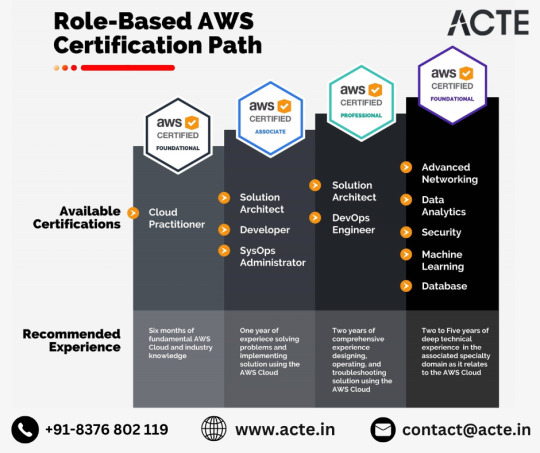
7. Pre-Sales Artistry: Crafting Compelling Solutions Leverage AWS certification in Pre-Sales Solutions Architect positions. Engaging with clients during the pre-sales phase, you become instrumental in understanding their needs and crafting compelling solutions.
8. Specialized Architectural Prowess: Exploring Niche Opportunities As technology evolves, specialized Solution Architect roles emerge. Depending on your interests and the evolving AWS service landscape, opportunities in areas like AI/ML architecture, IoT solutions, or serverless architectures beckon.
9. Entrepreneurial Odyssey: Beyond Conventional Paths Armed with AWS certification, entrepreneurial pursuits become viable. Whether offering specialized AWS services or launching a tech startup, the certification serves as a foundation for innovative endeavors.
10. Lifelong Learning Odyssey: Staying Ahead in the Dynamic AWS Realm The AWS ecosystem is dynamic, with constant updates and new services. Your certification journey becomes a springboard for continuous learning and professional development, ensuring you remain at the forefront of cloud technology.
In conclusion, AWS certification for Solution Architects is not just a validation; it's a compass guiding you through a rich tapestry of career possibilities. Whether crafting digital landscapes, steering enterprises through the cloud, or exploring niche opportunities, the certification becomes a catalyst for continuous growth, learning, and innovation in the ever-evolving cloud computing domain.
2 notes
·
View notes
Text
Unveiling the Ultimate Handbook for Aspiring Full Stack Developers
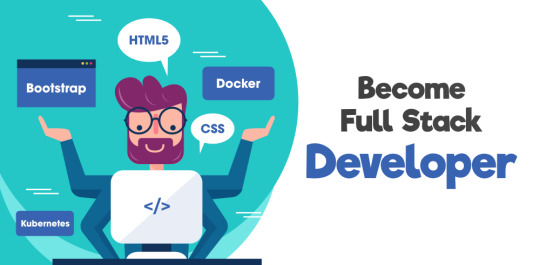
In the ever-evolving realm of technology, the role of a full-stack developer has undeniably gained prominence. Full-stack developers epitomize versatility and are an indispensable asset to any enterprise or endeavor. They wield a comprehensive array of competencies that empower them to navigate the intricate landscape of both front-end and back-end web development. In this exhaustive compendium, we shall delve into the intricacies of transforming into a proficient full-stack developer, dissecting the requisite skills, indispensable tools, and strategies for excellence in this domain.
Deciphering the Full Stack Developer Persona
A full-stack developer stands as a connoisseur of both front-end and back-end web development. Their mastery extends across the entire spectrum of web development, rendering them highly coveted entities within the tech sector. The front end of a website is the facet accessible to users, while the back end operates stealthily behind the scenes, handling the intricacies of databases and server management. You can learn it from Uncodemy which is the Best Full stack Developer Institute in Delhi.
The Requisite Competencies
To embark on a successful journey as a full-stack developer, one must amass a diverse skill set. These proficiencies can be broadly categorized into front-end and back-end development, coupled with other quintessential talents:
Front-End Development
Markup Linguistics and Style Sheets: Cultivating an in-depth grasp of markup linguistics and style sheets like HTML and CSS is fundamental to crafting visually captivating and responsive user interfaces.
JavaScript Mastery: JavaScript constitutes the linchpin of front-end development. Proficiency in this language is the linchpin for crafting dynamic web applications.
Frameworks and Libraries: Familiarization with popular front-end frameworks and libraries such as React, Angular, and Vue.js is indispensable as they streamline the development process and elevate the user experience.
Back-End Development
Server-Side Linguistics: Proficiency in server-side languages like Node.js, Python, Ruby, or Java is imperative as these languages fuel the back-end functionalities of websites.
Database Dexterity: Acquiring proficiency in the manipulation of databases, including SQL and NoSQL variants like MySQL, PostgreSQL, and MongoDB, is paramount.
API Expertise: Comprehending the creation and consumption of APIs is essential, serving as the conduit for data interchange between the front-end and back-end facets.
Supplementary Competencies
Version Control Proficiency: Mastery in version control systems such as Git assumes monumental significance for collaborative code management.
Embracing DevOps: Familiarity with DevOps practices is instrumental in automating and streamlining the development and deployment processes.
Problem-Solving Prowess: Full-stack developers necessitate robust problem-solving acumen to diagnose issues and optimize code for enhanced efficiency.
The Instruments of the Craft
Full-stack developers wield an arsenal of tools and technologies to conceive, validate, and deploy web applications. The following are indispensable tools that merit assimilation:
Integrated Development Environments (IDEs)
Visual Studio Code: This open-source code editor, hailed for its customizability, enjoys widespread adoption within the development fraternity.
Sublime Text: A lightweight and efficient code editor replete with an extensive repository of extensions.
Version Control
Git: As the preeminent version control system, Git is indispensable for tracking code modifications and facilitating collaborative efforts.
GitHub: A web-based platform dedicated to hosting Git repositories and fostering collaboration among developers.
Front-End Frameworks
React A potent JavaScript library for crafting user interfaces with finesse.
Angular: A comprehensive front-end framework catering to the construction of dynamic web applications.
Back-End Technologies
Node.js: A favored server-side runtime that facilitates the development of scalable, high-performance applications.
Express.js: A web application framework tailor-made for Node.js, simplifying back-end development endeavors.
Databases
MongoDB: A NoSQL database perfectly suited for managing copious amounts of unstructured data.
PostgreSQL: A potent open-source relational database management system.
Elevating Your Proficiency as a Full-Stack Developer
True excellence as a full-stack developer transcends mere technical acumen. Here are some strategies to help you distinguish yourself in this competitive sphere:
Continual Learning: Given the rapid evolution of technology, it's imperative to remain abreast of the latest trends and tools.
Embark on Personal Projects: Forge your path by creating bespoke web applications to showcase your skills and amass a portfolio.
Collaboration and Networking: Participation in developer communities, attendance at conferences, and collaborative ventures with fellow professionals are key to growth.
A Problem-Solving Mindset: Cultivate a robust ability to navigate complex challenges and optimize code for enhanced efficiency.
Embracing Soft Skills: Effective communication, collaborative teamwork, and adaptability are indispensable in a professional milieu.
In Closing
Becoming a full-stack developer is a gratifying odyssey that demands unwavering dedication and a resolute commitment to perpetual learning. Armed with the right skill set, tools, and mindset, one can truly shine in this dynamic domain. Full-stack developers are in high demand, and as you embark on this voyage, you'll discover a plethora of opportunities beckoning you.
So, if you aspire to join the echelons of full-stack developers and etch your name in the annals of the tech world, commence your journey by honing your skills and laying a robust foundation in both front-end and back-end development. Your odyssey to becoming an adept full-stack developer commences now.
5 notes
·
View notes
Text
#DevOps#DevOps Mastery#devops mastery training#devops mastery internship#devops internship in pune#e3l#e3l.co
0 notes
Text
Programming Languages Every B.Tech in Computer Science and Engineering Student Must Learn in 2025
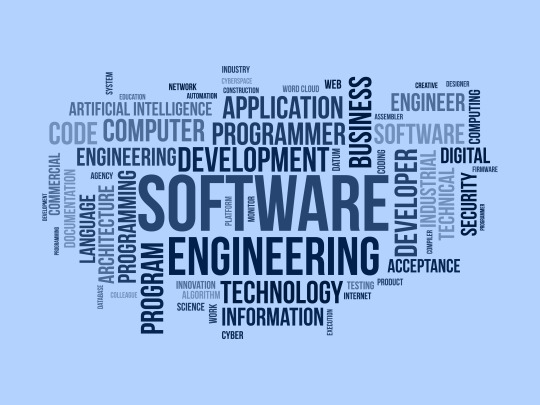
The expanding field of computer science and engineering demands that students stay proficient in key programming languages to remain competitive and effective software professionals. For students pursuing a B.Tech in Computer Science and Engineering, mastering both foundational and emerging programming languages is essential for academic performance and successful careers in software development, AI, cybersecurity, and related domains.
At leading institutions like Mohan Babu University, the curriculum is designed to integrate both theoretical foundations and advanced programming applications, ensuring that students of B.Tech Computer Science and Engineering are well-prepared for the tech industry’s fast-changing landscape.
1. Python
Python has established itself as a core part of the B.Tech Computer Science and Engineering syllabus, widely used across fields such as artificial intelligence, machine learning, data science, automation, and even web development. Its beginner-friendly syntax and immense ecosystem make it a preferred choice for both academic projects and advanced research.
Why it matters for Computer Science and Engineering: Enables rapid prototyping, data analytics, and is the go-to language for AI/ML specializations.
2. Java
Java is a staple of the computer science and engineering curriculum, commonly used for enterprise-level software development, Android apps, and scalable backend systems. Its platform independence aligns well with industry needs.
Benefits for B.Tech CSE students: Critical for developing robust applications, learning object-oriented programming, and building Android projects during academic labs.
3. C and C++
C and C++ are foundational languages taught from the first year of most B.Tech in Computer Science and Engineering programs. They enable students to learn low-level programming concepts, computer architecture, and high-performance system/application programming.
Benefits: Essential for competitive coding, system programming, and understanding computer hardware-software integration.
4. PHP
PHP remains relevant for B.Tech Computer Science and Engineering students focusing on web technologies, supported by MBU’s modern labs. It is crucial for backend development, powering many web servers and content management platforms.
5. JavaScript & Node.js
With the rise of interactive web applications, JavaScript and Node.js are now core skills for any computer science and engineering undergraduate. They cover both front-end and back-end web development and support full-stack projects regularly assigned in CSE programs.
Benefits: Builds modern web apps, enhances UI/UX, and is in high demand for internships and placements.
6. SQL & Oracle
SQL is the universal language for managing data in relational database systems — an integral part of the B.Tech Computer Science and Engineering syllabus. Exposure to tools like Oracle enables advanced database management skills crucial in nearly all IT roles.
7. Emerging and Specialized Languages
Depending on departmental specialization — such as AI, Cloud Computing, DevOps, or SAP — B.Tech Computer Science and Engineering students may encounter specialized languages or platforms like R (for data science), Swift (for iOS apps), Kotlin (for Android), and ABAP (for SAP).
Conclusion
For anyone pursuing a B.Tech in Computer Science and Engineering in 2025, the ability to learn, adapt, and apply these programming languages is a gateway to both academic excellence and career growth. The MBU Department of Computer Science and Engineering, through its industry-aligned curriculum and hands-on learning environment, ensures its graduates are equipped with practical mastery in these languages, ready to solve real-world problems in the ever-evolving digital era.
Stay curious, practice consistently, and capitalize on the opportunities your B.Tech CSE journey brings!
#engineeringcolleges#mbu#mohanbabuuniversity#mohanbabucollege#b.techcomputerscienceandengineering#computerscienceandengineering
0 notes
Text
What Can You Learn from a Full Stack Developer Course
Embarking on a journey to become a Certified Full Stack Developer is more than just learning to code it’s about mastering the art of building complete digital experiences from front to back. Whether you're eyeing the best full stack developer certification or already pursuing the CP-FSD certification, here's what you’ll gain from a robust full stack certification like the CFSD Certification. Get ready to level up your skillset with these essential capabilities: 🔧 Front-End Development Expertise Master the visual side of development using HTML, CSS, and JavaScript frameworks like React or Angular. As a certificate for full stack developer holder, you'll build responsive, user-friendly interfaces that deliver seamless experiences across all devices. 💾 Back-End Programming Mastery Dive deep into server-side logic using technologies like Node.js, Python, or Java. The Java full stack developer certification empowers you to create powerful, scalable APIs that handle complex business logic behind the scenes. 🗄️ Database Management Skills Learn to design, query, and manage both SQL and NoSQL databases like MySQL, PostgreSQL, or MongoDB. This core part of the full stack development certificate ensures you can store and retrieve data efficiently and securely. 🧩 API Integration & Web Services Understand how to integrate third-party services and connect applications through RESTful and GraphQL APIs. This skill is a must-have in today’s interconnected ecosystem for any CP FSD certification holder. 🔐 Authentication & Security Best Practices From implementing JWT tokens to setting up OAuth, your full stack certification will teach you how to protect user data and create secure applications that users trust. 🔄 DevOps & Deployment Proficiency Gain hands-on experience with CI/CD pipelines, containerization tools like Docker, and cloud platforms such as AWS or Azure. The CP-FSD curriculum ensures you're not just building apps you're shipping them reliably. 🧠 Problem-Solving & Debugging Techniques Develop the mindset of a true engineer. A certified full stack developer doesn’t just write code they solve real-world problems using clean, efficient logic and modern debugging tools. 🌐 Version Control with Git & GitHub Collaborate like a pro using Git and GitHub. These tools are essential for managing code changes, contributing to teams, and streamlining development workflows. 🎨 UI/UX Design Principles Learn the fundamentals of user experience and design thinking. A well-rounded certificate for full stack developer program focuses not only on how things work, but also how they look and feel. 💼 Project Management & Agile Development Understand agile methodologies like Scrum, Kanban, and standups. The CP FSD certification arms you with the soft skills needed to thrive in collaborative development environments. Ready to future-proof your career and become a tech powerhouse? 💻 Enroll now in the CFSD Certification program or reach out at 📞 +41 444 851189 to learn more. #FullStackDeveloper #CFSD #CPFSD #CertifiedFullStackDeveloper #FullStackCertification #JavaFullStackDeveloper #WebDevelopment #TechSkills #CareerInTech #BestFullStackCertification #LearnToCode #DeveloperJourney #FullStackDev #BuildWithCode #FutureReady
#cfsd certification#certified full stack developer#full stack certification#java full stack developer certification#cp-fsd#full stack development certificate#certificate for full stack developer#cp fsd certification#best full stack developer certification
0 notes
Text
DevOps for Beginners: Navigating the Learning Landscape
DevOps, a revolutionary approach in the software industry, bridges the gap between development and operations by emphasizing collaboration and automation. For beginners, entering the world of DevOps might seem like a daunting task, but it doesn't have to be. In this blog, we'll provide you with a step-by-step guide to learn DevOps, from understanding its core philosophy to gaining hands-on experience with essential tools and cloud platforms. By the end of this journey, you'll be well on your way to mastering the art of DevOps.
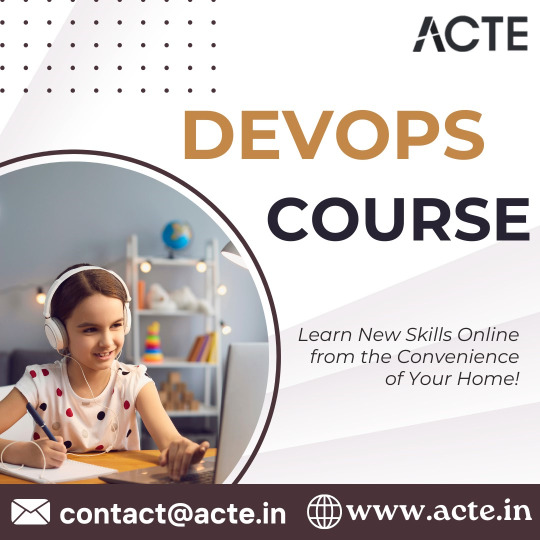
The Beginner's Path to DevOps Mastery:
1. Grasp the DevOps Philosophy:
Start with the Basics: DevOps is more than just a set of tools; it's a cultural shift in how software development and IT operations work together. Begin your journey by understanding the fundamental principles of DevOps, which include collaboration, automation, and delivering value to customers.
2. Get to Know Key DevOps Tools:
Version Control: One of the first steps in DevOps is learning about version control systems like Git. These tools help you track changes in code, collaborate with team members, and manage code repositories effectively.
Continuous Integration/Continuous Deployment (CI/CD): Dive into CI/CD tools like Jenkins and GitLab CI. These tools automate the building and deployment of software, ensuring a smooth and efficient development pipeline.
Configuration Management: Gain proficiency in configuration management tools such as Ansible, Puppet, or Chef. These tools automate server provisioning and configuration, allowing for consistent and reliable infrastructure management.
Containerization and Orchestration: Explore containerization using Docker and container orchestration with Kubernetes. These technologies are integral to managing and scaling applications in a DevOps environment.
3. Learn Scripting and Coding:
Scripting Languages: DevOps engineers often use scripting languages such as Python, Ruby, or Bash to automate tasks and configure systems. Learning the basics of one or more of these languages is crucial.
Infrastructure as Code (IaC): Delve into Infrastructure as Code (IaC) tools like Terraform or AWS CloudFormation. IaC allows you to define and provision infrastructure using code, streamlining resource management.
4. Build Skills in Cloud Services:
Cloud Platforms: Learn about the main cloud providers, such as AWS, Azure, or Google Cloud. Discover the creation, configuration, and management of cloud resources. These skills are essential as DevOps often involves deploying and managing applications in the cloud.
DevOps in the Cloud: Explore how DevOps practices can be applied within a cloud environment. Utilize services like AWS Elastic Beanstalk or Azure DevOps for automated application deployments, scaling, and management.
5. Gain Hands-On Experience:
Personal Projects: Put your knowledge to the test by working on personal projects. Create a small web application, set up a CI/CD pipeline for it, or automate server configurations. Hands-on practice is invaluable for gaining real-world experience.
Open Source Contributions: Participate in open source DevOps initiatives. Collaborating with experienced professionals and contributing to real-world projects can accelerate your learning and provide insights into industry best practices.
6. Enroll in DevOps Courses:
Structured Learning: Consider enrolling in DevOps courses or training programs to ensure a structured learning experience. Institutions like ACTE Technologies offer comprehensive DevOps training programs designed to provide hands-on experience and real-world examples. These courses cater to beginners and advanced learners, ensuring you acquire practical skills in DevOps.

In your quest to master the art of DevOps, structured training can be a game-changer. ACTE Technologies, a renowned training institution, offers comprehensive DevOps training programs that cater to learners at all levels. Whether you're starting from scratch or enhancing your existing skills, ACTE Technologies can guide you efficiently and effectively in your DevOps journey. DevOps is a transformative approach in the world of software development, and it's accessible to beginners with the right roadmap. By understanding its core philosophy, exploring key tools, gaining hands-on experience, and considering structured training, you can embark on a rewarding journey to master DevOps and become an invaluable asset in the tech industry.
7 notes
·
View notes
Text
Navigating the Thriving DevOps Job Market in India
In the dynamic realm of the IT industry, DevOps stands as a revolutionary force, reshaping how software is developed and delivered. For professionals in India, a career in DevOps not only opens doors to exciting opportunities but also aligns seamlessly with the industry's shift towards agile and efficient software development practices.
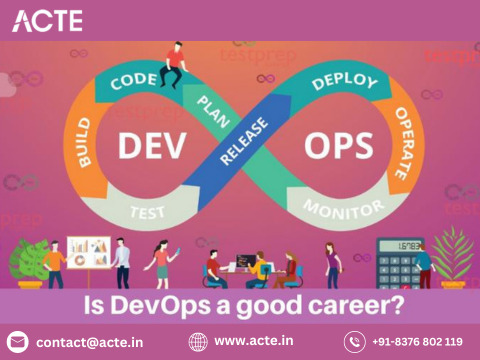
1. Tech Hub Demand
India, a global technology hub, is experiencing an unprecedented demand for skilled DevOps professionals. From established IT giants to dynamic startups, companies recognize the strategic value of DevOps in driving faster and more reliable software development cycles. This surge in demand translates into abundant career opportunities for individuals eager to make their mark in the industry.
2. Automation Mastery
DevOps places a significant emphasis on automation, a skill highly sought after in the Indian job market. As organizations prioritize efficiency, error reduction, and accelerated release cycles, professionals with strong automation skills are consistently in demand. DevOps, with its automation-centric approach, positions individuals as key contributors to achieving these organizational goals.
3. Collaboration and Communication Trends
DevOps' collaborative nature aligns perfectly with current industry trends. Emphasizing breaking down silos between development and operations teams, fostering seamless communication, and creating a culture of collaboration, DevOps principles not only drive efficient workflows but also resonate with the evolving work culture in Indian IT organizations.
4. CI/CD: Driving Modern Development
Continuous Integration and Continuous Deployment (CI/CD) are integral to modern software development practices. DevOps professionals play a pivotal role in implementing and optimizing CI/CD pipelines, reflecting the agile methodologies widely adopted by Indian IT organizations. This emphasis on CI/CD positions DevOps as a linchpin in achieving faster and more reliable software releases.
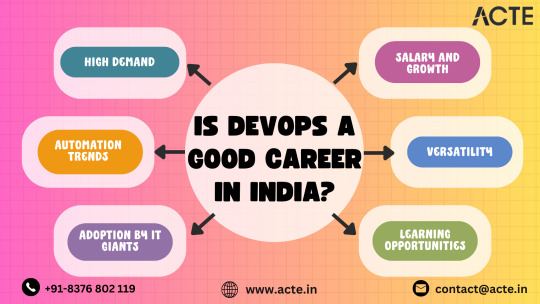
5. Endorsement by IT Giants
Major IT companies and startups in India have embraced DevOps practices, underscoring its significance in achieving business success. This widespread adoption creates an abundance of opportunities for DevOps professionals to contribute to the success stories of leading organizations.
6. Salary and Growth Prospects
DevOps professionals in India enjoy competitive salaries and robust opportunities for career growth. The strategic impact of DevOps on business outcomes is recognized by organizations, leading to a steady rise in demand for skilled professionals. This trend positions DevOps as a lucrative and rewarding career path for those looking to thrive in the IT industry.
7. Versatility Across Industries
DevOps skills are versatile and applicable across various industries, providing professionals with a broad spectrum of career options. Whether in finance, healthcare, e-commerce, or any other sector, the principles of DevOps remain relevant, making it a resilient and adaptable skill set.
8. Continuous Learning Opportunities
The dynamic nature of DevOps offers continuous learning opportunities. Professionals can stay updated with the latest industry trends and technologies, ensuring their skill set remains cutting-edge. This commitment to continuous learning not only enhances individual capabilities but also contributes to the overall growth of the DevOps community in India.
In conclusion, a DevOps career in India is more than just a job; it's an opportunity to lead innovation in the IT industry. With high demand, competitive salaries, and a culture of collaboration, DevOps professionals are shaping the future of software development in India. As organizations prioritize efficiency and agility, the role of DevOps becomes increasingly pivotal, making it an exciting and promising career choice for individuals passionate about driving positive change in the technology landscape.
2 notes
·
View notes
Text
Master YAML, JSON & JSONPath Like a Pro with This Ultimate Course

If you’ve ever peeked into the world of software development, DevOps, or data handling, you’ve probably come across YAML, JSON, and JSONPath. These aren't just tech buzzwords—they're foundational tools used by developers, sysadmins, testers, and analysts across industries. But let’s face it, they can be confusing at first. That’s exactly why the Ultimate YAML Course: YAML JSON JSONPath Zero - Master is a game-changer for anyone looking to master these powerful data formats and querying languages with ease.
Let’s break down what makes this course a must-have in your learning arsenal.
🚀 Why You Need YAML, JSON, and JSONPath Today
YAML and JSON are the backbones of modern configuration files, APIs, and data communication formats. Whether you're configuring Kubernetes clusters, writing GitHub Actions, managing AWS CloudFormation, or interacting with REST APIs, you're bound to run into one (or all) of these technologies.
JSON (JavaScript Object Notation) is everywhere—mobile apps, web servers, and databases use it daily. YAML, with its clean indentation and human-friendly structure, is quickly becoming the default for configuration files in DevOps and CI/CD workflows. And then there’s JSONPath—an incredibly handy tool to extract and manipulate JSON data easily.
Yet despite their popularity, many professionals still fumble when working with these tools. Why? Because their documentation is dry, scattered, or too technical. That’s where the Ultimate YAML Course comes in to save the day.
🧠 What This Course Teaches (In Plain English)
You don’t need to be a coder to start this course. That’s the beauty of it. Whether you’re a beginner just stepping into the world of data or a working professional who wants to polish your skills, the course starts from zero and walks you through to mastery.
Here’s a sneak peek at what’s inside:
YAML Fundamentals: Understand indentation, lists, dictionaries, anchors, and references.
JSON Deep Dive: Learn how to read, write, format, and validate JSON data effortlessly.
JSON vs YAML: Get a clear picture of when to use each and why.
JSONPath Simplified: Learn to filter and extract data from JSON with powerful expressions.
Real-World Use Cases: You won’t just learn theory. You’ll see these formats in action—configuring files, interacting with APIs, and handling practical data workflows.
And it’s all delivered in bite-sized lessons, so you’re never overwhelmed.
🎯 Who Should Take This Course?
This course isn’t just for developers. If your work involves configuration files, data management, system integration, or cloud services—this course will make your job easier and smarter.
DevOps Engineers: Automate infrastructure using YAML (Kubernetes, Docker Compose).
QA Testers: Parse and assert data from JSON APIs using JSONPath.
Backend Developers: Understand data interchange formats like JSON.
Tech Writers: Document API calls and data structures more accurately.
Students & Beginners: Build foundational knowledge with practical examples.
Whether you’re preparing for a job, tackling a project, or just curious—this course meets you right where you are.
🌟 What Makes This Course Different?
There are hundreds of tutorials online. Why choose this one?
Crystal-Clear Explanations: No fluff. No jargon. Just simplified concepts that click.
Practical Examples: Work with real files and use cases you’ll see on the job.
Zero to Mastery Structure: Start with nothing and leave as a confident YAML/JSON/JSONPath user.
Lifetime Access: Come back and review any time you hit a tricky file or need a refresher.
Plus, you’ll gain confidence as you build real-world hands-on skills—not just theory. It’s like having a mentor who actually gets how people learn best.
🛠️ Skills You’ll Walk Away With
By the time you finish the course, you’ll:
✅ Understand and write clean YAML files for any tool or platform ✅ Debug and format JSON like a pro ✅ Navigate nested JSON data with JSONPath ✅ Know when to use YAML vs JSON in projects ✅ Feel confident handling any configuration or API data file thrown your way
You’ll unlock a skillset that’s in demand across industries—whether you're managing cloud deployments, writing CI/CD pipelines, or consuming third-party APIs.
💼 Why It Matters for Your Career
Being fluent in YAML and JSON isn’t a bonus anymore—it’s a necessity. Every modern stack depends on data formats that are clean, structured, and easy to manage. If you’re looking to:
Land a job in DevOps, software testing, or backend development
Work with modern frameworks like Kubernetes, Ansible, or Terraform
Handle API responses with ease
Pass technical interviews with confidence
Or simply become more productive and efficient…
…then this course is your shortcut to success.
Many employers value practical knowledge over fancy degrees. When you can prove that you can confidently read and write these formats, you stand out. And with this course, you’ll be ready to show off your skills on day one.
🎉 Ready to Learn YAML, JSON, and JSONPath Once and For All?
If you’re tired of Googling basic syntax every time you see a YAML or JSON file, or if you’re confused about how JSONPath works, it’s time to take control.
The Ultimate YAML Course: YAML JSON JSONPath Zero - Master will teach you everything you need to know in a fun, clear, and practical way.
Don’t just be someone who uses these formats—be someone who masters them.
Your journey to mastering modern data formats starts now. 🚀
0 notes